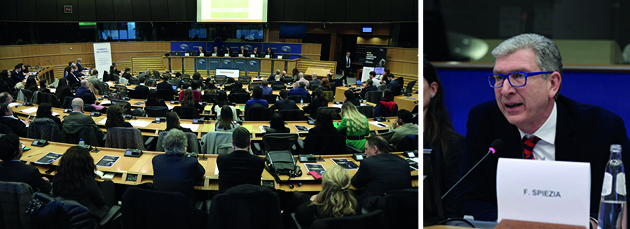At a conference on fighting the influence of organised crime held at the European Parliament in Brussels, Eurojust's Vice-President and National Member for Italy, Mr Filippo Spiezia, called for a new EU-wide strategy to properly respond to criminal organisations such as the 'Ndrangetha, the Mafia or the Camorra.
During his speech, Mr Spiezia pointed out that these groups are long-term criminal projects involved in various forms of profitable illegal activities, such as the smuggling of migrants, drugs and weapons. Their evolving transnational business model disrupts and undermines local communities, public and private institutions, and the values of our democracies.
Mr Spiezia explained that the 2008 Framework Decision on Organised Crime is no longer completely adequate to counter the current activities of the respective groups. Instead, he recommended to take initiatives towards a new European legal instrument on the basis of Article 83 of the Treaty of Lisbon. This should include a legal framework for collaboration with pentiti, former members of criminal organisations who choose to cooperate with the prosecutors.
In light of these challenges, Mr Spiezia underlined the importance of Eurojust as the epicentre of judicial cooperation in the European Union. The Member States are increasingly seeking the Agency's support to coordinate their complex investigations, enhance the exchange of information and seek judicial support in cross-border crimes.
Over the past years, Eurojust has helped national authorities in dismantling several criminal networks. In 2018, for example, the Agency played a crucial role in one of the biggest organised crime investigations of its kind in Europe to date. Code-named 'Operation Pollino', it saw judicial and law enforcement authorities in the Netherlands, Italy, Germany, Belgium, Luxembourg, the UK, Spain and Portugal take coordinated and decisive action against the 'Ndrangheta, one of the most powerful criminal networks in the world. The operation resulted in 84 arrests, the detection of almost 4.000 kg of cocaine and large quantities of other drugs, as well as the seizure of an estimated EUR 2 million in criminal assets.

Photos © European Parliament
